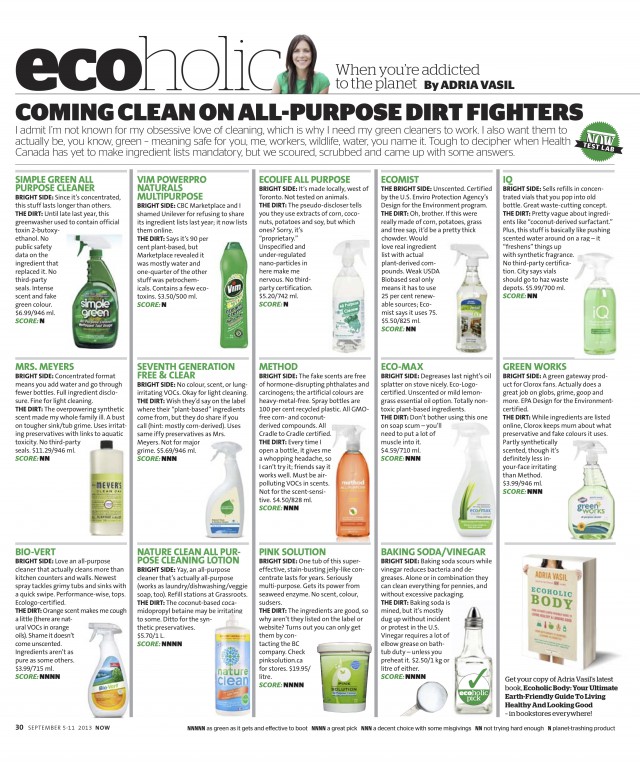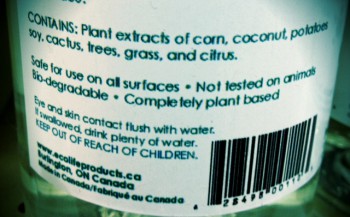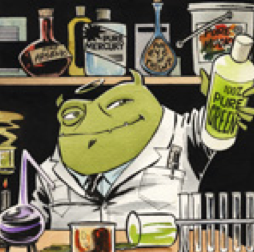The Dirt on Green Cleaners: a guide to all purpose cleaners
September 11, 2013
 It isn’t easy reviewing green cleaners – especially when it’s still not mandatory for cleaning companies to disclose their ingredients. The good news is that while too many brands aren’t listing their ingredients on the bottles, more and more are coming clean, so to speak, on their websites, at least. Even Vim ProPower Naturals, who we slammed on CBC Marketplace last year
It isn’t easy reviewing green cleaners – especially when it’s still not mandatory for cleaning companies to disclose their ingredients. The good news is that while too many brands aren’t listing their ingredients on the bottles, more and more are coming clean, so to speak, on their websites, at least. Even Vim ProPower Naturals, who we slammed on CBC Marketplace last year  for being tight-lipped about their ingredients, is now (sort of) sharing online. Others, like Ecolife, are clinging to pronouncements that their ingredients are “proprietary” and wouldn’t share upon request, beyond saying they’re made of “corn, coconut, potatoes, etc.” Sorry but that’s a stew recipe, not an honest disclosure of synthesized corn/coconut/potato-derived ingredients. Most are still only half honest with you – they list some ingredients then offer up vagueries like “preservative” or “coconut-based surfactant.” Not good enough.
for being tight-lipped about their ingredients, is now (sort of) sharing online. Others, like Ecolife, are clinging to pronouncements that their ingredients are “proprietary” and wouldn’t share upon request, beyond saying they’re made of “corn, coconut, potatoes, etc.” Sorry but that’s a stew recipe, not an honest disclosure of synthesized corn/coconut/potato-derived ingredients. Most are still only half honest with you – they list some ingredients then offer up vagueries like “preservative” or “coconut-based surfactant.” Not good enough.
Interesting research out of Ottawa U led by biology prof Adam Oliver Brown and Justyn Pellizzari looked into “science communication in green marketing” in the field of household cleaning products. They found the market awash in, well, greenwash. They did a sweep of 5 major retailers (Loblaws, Metro, Rexall, Shoppers and Walmart), tallied all the green claims amongst all purpose cleaners then cross checked them against Terra Choice’s 7 Sins of Greenwashing. The results? “Green products made up between 13 and 20 percent of each store’s total inventory of all-purpose cleaners.” Of the 15 products making green claims, “almost 87% committed at least one of the seven sins of greenwashing.” The only two that didn’t commit any sins were EcoMax and Nature Clean.
 Ultimately, the scores in the latest Ecoholic all purpose cleaning guide in NOW are based on a bunch of factors. Questions asked include: are the products/ingredients safe for human use, safe for the environment, are they third party certified, do they fully disclose their ingredients (on the label, on the website, upon request) and are the products actually effective? A super honest, clean product like EcoMax still won’t get a perfect score unless it works beautifully. Performance, wise, I didn’t love it as much as others so it got a 3 – a “decent pick with some misgivings.” A company like Method which I’ve always called a greenwasher, earned an extra point for becoming more open than most about their precise ingredients online and the efforts they’ve gone to make their synthetic ingredients like scent and colour, free of carcinogens, etc. Plus for other reasons mentioned in the column, instead of it getting a 2 , it also got a 3 out of 5. So you see my point- it’s not easy ranking green cleaners. A lot of factors went into all of these scores.
Ultimately, the scores in the latest Ecoholic all purpose cleaning guide in NOW are based on a bunch of factors. Questions asked include: are the products/ingredients safe for human use, safe for the environment, are they third party certified, do they fully disclose their ingredients (on the label, on the website, upon request) and are the products actually effective? A super honest, clean product like EcoMax still won’t get a perfect score unless it works beautifully. Performance, wise, I didn’t love it as much as others so it got a 3 – a “decent pick with some misgivings.” A company like Method which I’ve always called a greenwasher, earned an extra point for becoming more open than most about their precise ingredients online and the efforts they’ve gone to make their synthetic ingredients like scent and colour, free of carcinogens, etc. Plus for other reasons mentioned in the column, instead of it getting a 2 , it also got a 3 out of 5. So you see my point- it’s not easy ranking green cleaners. A lot of factors went into all of these scores.
As the Ottawa U researchers concluded, “At the end of the day, the number one way to guarantee you won’t be fooled by companies using greenwashing on their products is to avoid them all in general. Water, vinegar or lemon, and baking soda are enough to clean almost every surface in your home.” Hear, hear. That’s why DIY ingredients are the Ecoholic pick of the week.
